英语七年级上册Unit 3 How was your school trip-导学案-鲁教版(五四学制)
文档属性
| 名称 | 英语七年级上册Unit 3 How was your school trip-导学案-鲁教版(五四学制) |
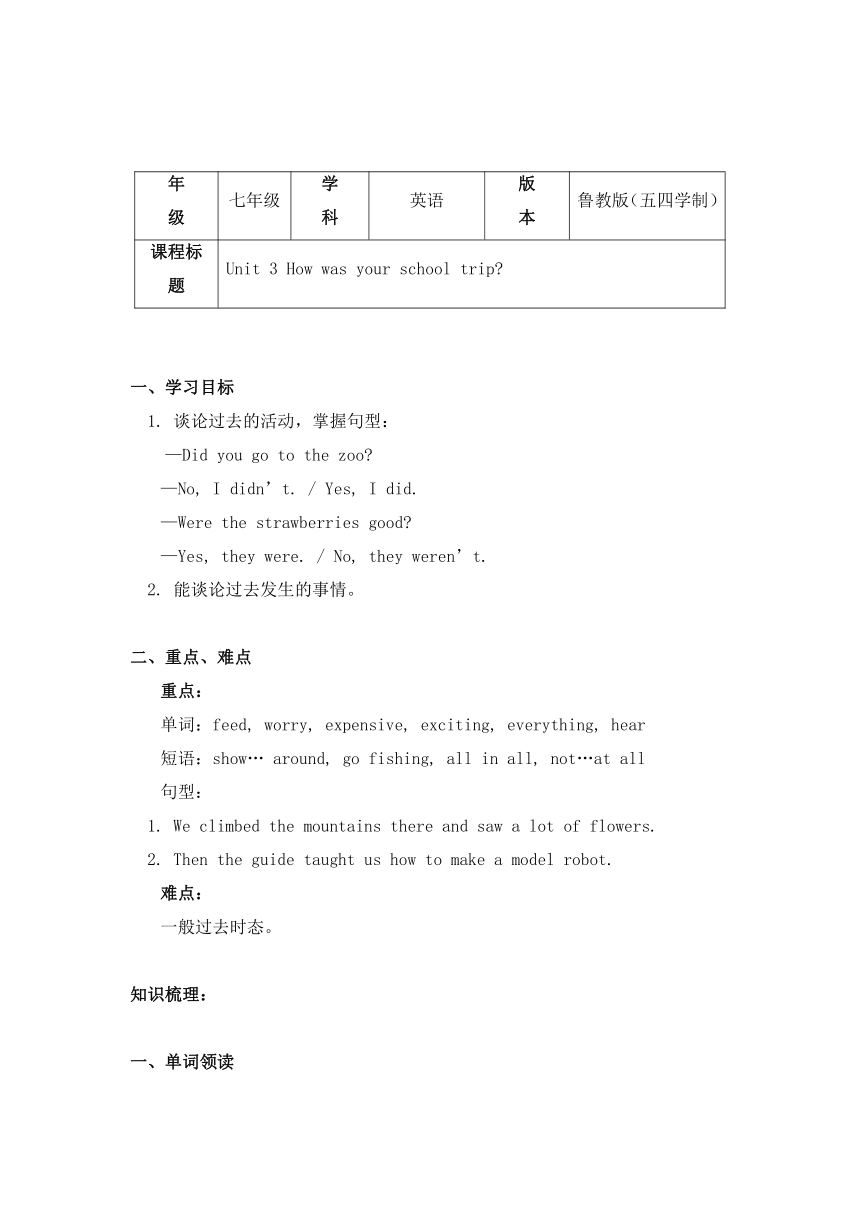
|
|
| 格式 | doc | ||
| 文件大小 | 1.1MB | ||
| 资源类型 | 教案 | ||
| 版本资源 | 鲁教版 | ||
| 科目 | 英语 | ||
| 更新时间 | 2020-09-30 00:00:00 | ||
图片预览

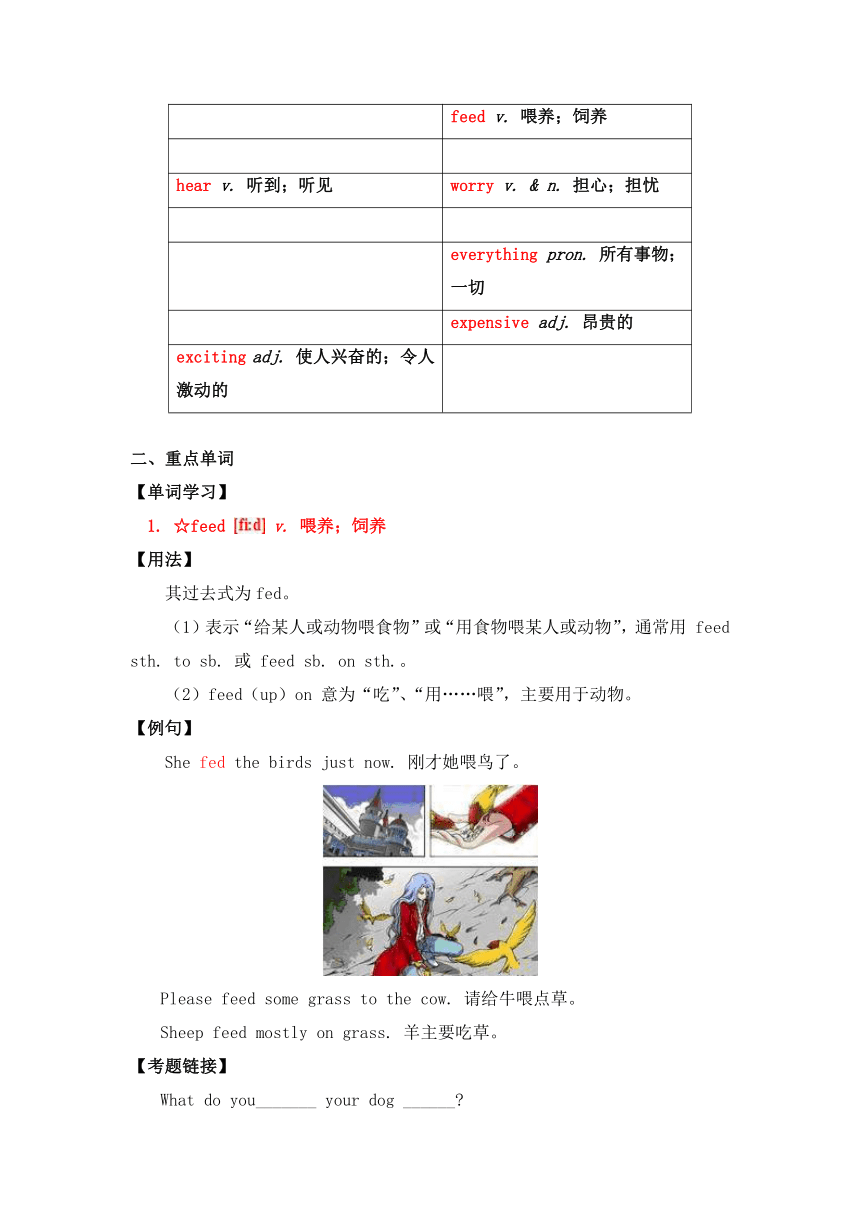
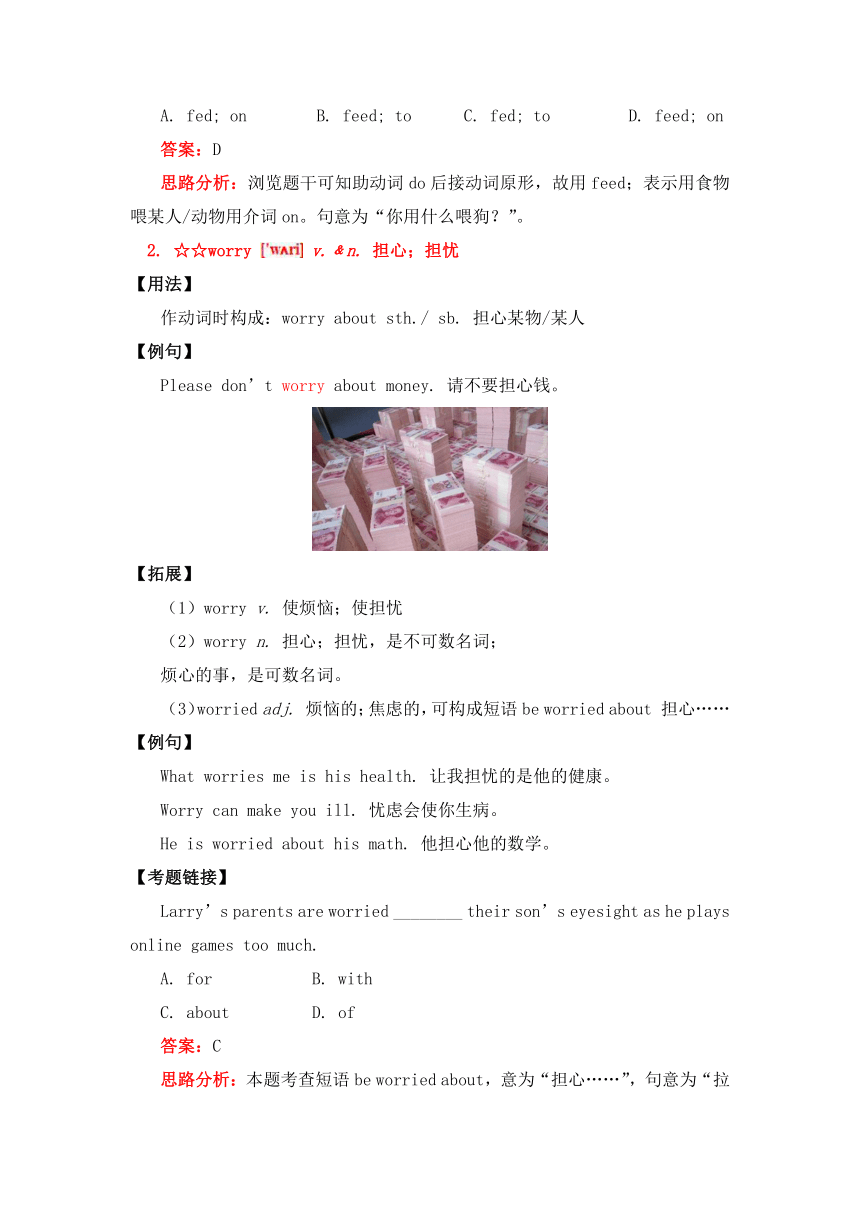
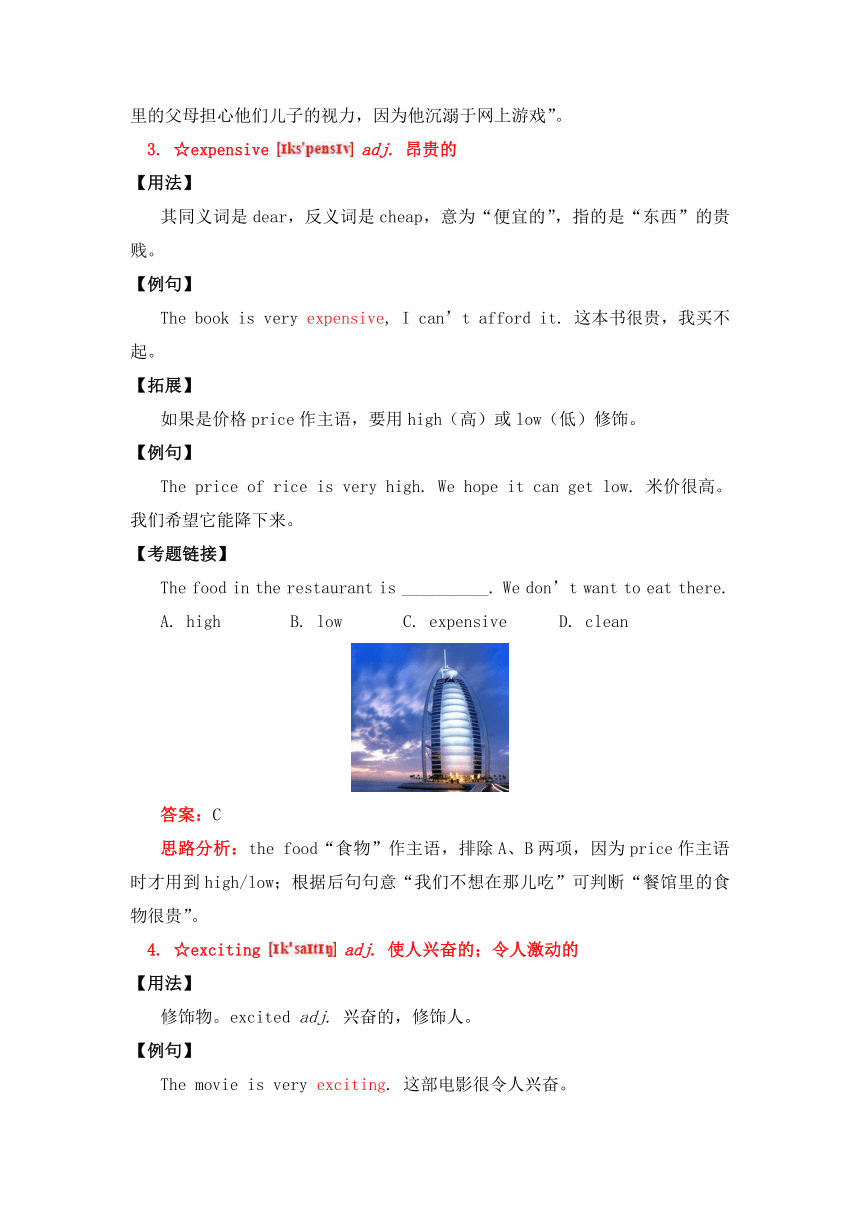
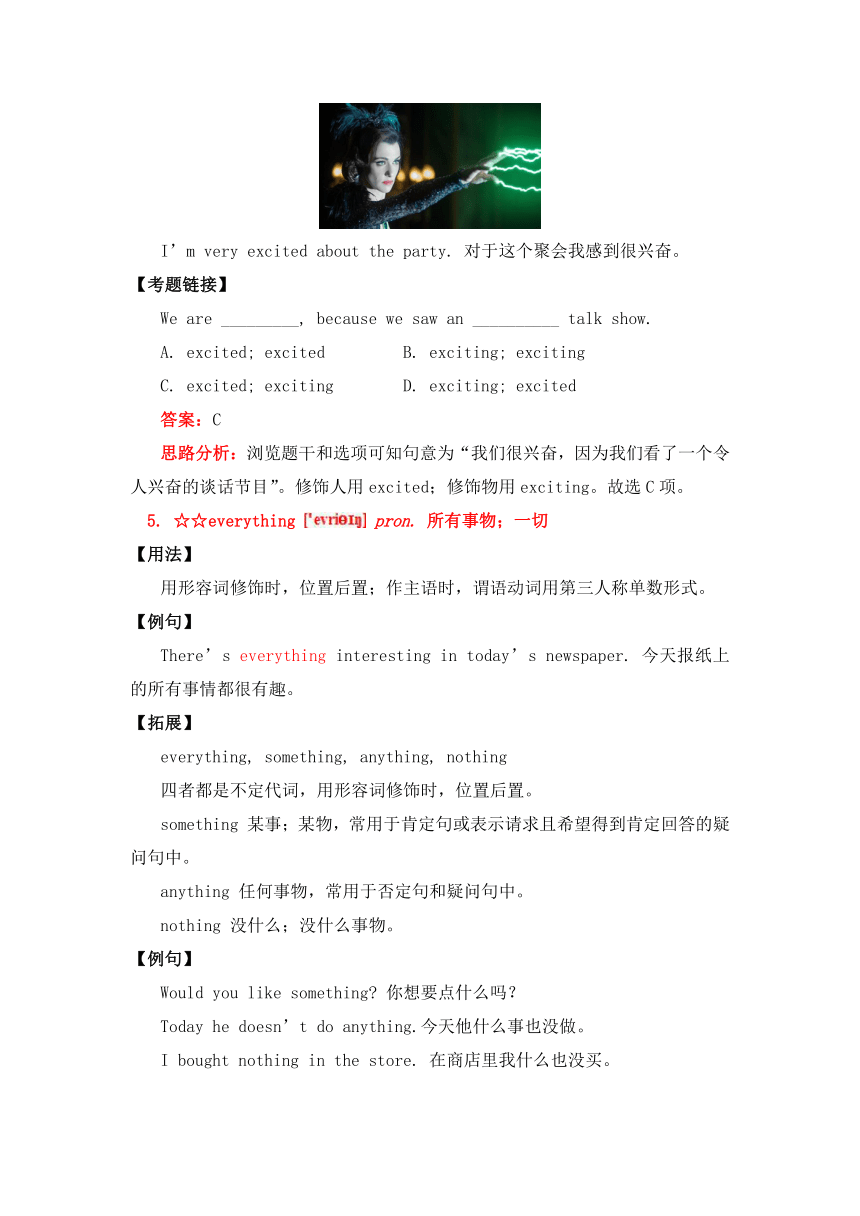
文档简介
年 级 七年级 学 科 英语 版 本 鲁教版(五四学制)
课程标题 Unit 3 How was your school trip?
一、学习目标
1. 谈论过去的活动,掌握句型:
—Did you go to the zoo?
—No, I didn’t. / Yes, I did.
—Were the strawberries good?
—Yes, they were. / No, they weren’t.
2. 能谈论过去发生的事情。
二、重点、难点
重点:
单词:feed, worry, expensive, exciting, everything, hear
短语:show… around, go fishing, all in all, not…at all
句型:
1. We climbed the mountains there and saw a lot of flowers.
2. Then the guide taught us how to make a model robot.
难点:
一般过去时态。
知识梳理:
一、单词领读
feed v. 喂养;饲养
hear v. 听到;听见 worry v. & n. 担心;担忧
everything pron. 所有事物;一切
expensive adj. 昂贵的
exciting adj. 使人兴奋的;令人激动的
二、重点单词
【单词学习】
1. ☆feed v. 喂养;饲养
【用法】
其过去式为fed。
(1)表示“给某人或动物喂食物”或“用食物喂某人或动物”,通常用 feed sth. to sb. 或 feed sb. on sth.。
(2)feed(up)on 意为“吃”、“用……喂”,主要用于动物。
【例句】
She fed the birds just now. 刚才她喂鸟了。
Please feed some grass to the _cow_. 请给牛喂点草。
Sheep feed mostly on grass. 羊主要吃草。
【考题链接】
What do you_______ your dog ______?
A. fed; on B. feed; to C. fed; to D. feed; on
答案:D
思路分析:浏览题干可知助动词do后接动词原形,故用feed;表示用食物喂某人/动物用介词on。句意为“你用什么喂狗?”。
2. ☆☆worry v.﹠n. 担心;担忧
【用法】
作动词时构成:worry about sth./ sb. 担心某物/某人
【例句】
Please don’t worry about money. 请不要担心钱。
【拓展】
(1)worry v. 使烦恼;使担忧
(2)worry n. 担心;担忧,是不可数名词;
烦心的事,是可数名词。
(3)worried adj. 烦恼的;焦虑的,可构成短语be worried about 担心……
【例句】
What worries me is his health. 让我担忧的是他的健康。
Worry can make you ill. 忧虑会使你生病。
He is worried about his math. 他担心他的数学。
【考题链接】
Larry’s parents are worried ________ their son’s eyesight as he plays online games too much.
A. for B. with
C. about D. of
答案:C
思路分析:本题考查短语be worried about,意为“担心……”,句意为“拉里的父母担心他们儿子的视力,因为他沉溺于网上游戏”。
3. ☆expensive adj. 昂贵的
【用法】
其同义词是dear,反义词是cheap,意为“便宜的”,指的是“东西”的贵贱。
【例句】
The book is very expensive, I can’t afford it. 这本书很贵,我买不起。
【拓展】
如果是价格price作主语,要用high(高)或low(低)修饰。
【例句】
The price of rice is very high. We hope it can get low. 米价很高。我们希望它能降下来。
【考题链接】
The food in the restaurant is __________. We don’t want to eat there.
A. high B. low C. expensive D. clean
答案:C
思路分析:the food“食物”作主语,排除A、B两项,因为price作主语时才用到high/low;根据后句句意“我们不想在那儿吃”可判断“餐馆里的食物很贵”。
4. ☆exciting adj. 使人兴奋的;令人激动的
【用法】
修饰物。excited adj. 兴奋的,修饰人。
【例句】
The movie is very exciting. 这部电影很令人兴奋。
I’m very excited about the party. 对于这个聚会我感到很兴奋。
【考题链接】
We are _________, because we saw an __________ talk show.
A. excited; excited B. exciting; exciting
C. excited; exciting D. exciting; excited
答案:C
思路分析:浏览题干和选项可知句意为“我们很兴奋,因为我们看了一个令人兴奋的谈话节目”。修饰人用excited;修饰物用exciting。故选C项。
5. ☆☆everything pron. 所有事物;一切
【用法】
用形容词修饰时,位置后置;作主语时,谓语动词用第三人称单数形式。
【例句】
There’s everything interesting in today’s newspaper. 今天报纸上的所有事情都很有趣。
【拓展】
everything, something, anything, nothing
四者都是不定代词,用形容词修饰时,位置后置。
something 某事;某物,常用于肯定句或表示请求且希望得到肯定回答的疑问句中。
anything 任何事物,常用于否定句和疑问句中。
nothing 没什么;没什么事物。
【例句】
Would you like something? 你想要点什么吗?
Today he doesn’t do anything.今天他什么事也没做。
I bought nothing in the store. 在商店里我什么也没买。
【考题链接】
Mr. Wang, I want to talk with you. I have __________ to tell you after class.
A. everything B. something C. anything D. nothing
答案:B
思路分析:本题考查不定代词。根据前句“王老师,我想和你谈谈”说明“课后我有事要告诉你”,故选B项。
6. ☆☆hear v. 听到;听见
【用法】
过去式为heard。
(1)hear sb. do sth. 听到某人做了某事,动作已发生
(2)hear sb. doing sth. 听到某人正在做某事,动作正在进行
【例句】
I heard him play the violin just now. 刚才我听到他拉小提琴了。
I heard her singing in the next room. 我听到她正在隔壁房间唱歌。
【拓展】
(1)hear of/ about 听说
(2)hear from sb. 收到某人的来信
【例句】
I heard of/ about the popular singer. 我听说过那位流行歌手了。
Did you hear from your son last week? 上周你收到你儿子的来信了吗?
【辨析】
hear, listen
(1)hear是及物动词,听到,听见,侧重听的结果,可接宾语补足语。
(2)listen是不及物动词,听,强调听的动作,固定搭配:listen to。
【考题链接】
__________ me carefully, boys and girls. Can you _________ me?
A. Listen to; hear from B. Hear; listen to
C. Hear; hear D. Listen to; hear
答案:D
思路分析:本题考查“听”的区别。浏览各选项可知,listen to意为“听”,强调听的动作,后接宾语;hear from意为“收到某人来信”;hear意为“听见”,强调听的结果;根据句意“孩子们,请认真听我讲。你们能听到我讲话吗?”可知D项合适。
【即学即练】
根据句意及首字母提示完成单词
1. He doesn’t want to do a_________.
2. The books are e__________, so I didn’t buy them.
3. Can you h_________ me? I speak loudly.
4. Don’t w__________ about Mary. She’ll be OK.
5. We had an e_________ vacation.
6. John often f__________ grass to the sheep.
答案:1. anything 2. expensive 3. hear 4. worry 5. exciting 6. feeds
三、重点短语
【短语学习】
1. ☆ show… around 带领……参观
【用法】
show还有如下用法:
(1)show sb. sth. = show sth. to sb. 给某人展示某物
(2)show n. 演出;节目;展示
(3)on show 展览
【例句】
Would you like to show me around your new house? 你想带领我参观一下你的新家吗?
Please show me your homework. =Please show your homework to me. 请把你的作业给我看看。
【考题链接】
The teacher ________ me _________ his school yesterday.
A. show; around B. showed; to C. showed; around D. shows; to
答案:C
思路分析:根据句中的yesterday可知时态用一般过去时;show的过去式为showed;根据句意“昨天那位老师带领我参观了他的学校”可知用around。故选C项。
2. ☆☆go fishing 去钓鱼
【用法】
其结构为:go+动词-ing形式,表示“去做和这个动词有关的具体动作”。
【例句】
Would you like to go fishing with me? 你愿意和我一起去钓鱼吗?
【拓展】
常用的go+动词-ing形式的短语还有:
go swimming去游泳;go skating去滑冰等。
【考题链接】
Mary likes __________ every Sunday.
A. go fishing B. to go fishing C. going fishing D. going to fishing
答案:C
思路分析:根据every Sunday“每个星期天”可知是表示习惯性的爱好;且go fishing为固定短语,意为“钓鱼”。
3. all in all 总的来说;总而言之
【用法】
用来对所阐述的内容进行概括性总结和归纳。
【例句】
All in all, the book is interesting. 总而言之,这本书是有趣的。
【考题链接】
翻译
总的来说,他是幸运的。
_________ ________ ________, he is lucky.
答案:All in all
4. not…at all 一点也不;根本不
【用法】
not要与助动词、系动词be、情态动词连用。
【例句】
He can’t play basketball at all. 他一点也不会打篮球。
【拓展】
Not at all. 不客气;不用谢。
【例句】
—Thanks for your help. 谢谢你的帮助。
—Not at all. 不客气。
【考题链接】
They _______ climb that mountain _________.
A. not; at all B. didn’t; all C. didn’t; at all D. not did; at all
答案:C
思路分析:not要与助动词、系动词be、情态动词连用,故A项错误;B项短语不正确;D项not应放在did后,也错误,只有B项正确。句意为“他们根本没有爬那座山”。
【即学即练】
英汉词组互译
1. go fishing _________ 2. 在夜间 ________
3. show… around ________ 4. 根本不;一点也不 ________
5. all in all ________ 6. 最最重要的东西 _________
7. go for a walk ________ 8. 对……感兴趣 ________
答案:1. 去钓鱼 2. at night 3. 带领……参观 4. not…at all
5. 总而言之 6. all in all 7. 去散步 8. be interested in
四、重点句型
【句型学习】
1. We climbed the mountains there and saw a lot of flowers.
我们在那儿爬了山并看到了许多花。
【句析】
本句是简单句,含有一般过去时态。
【考点1】
一般过去时表示过去某个时间发生的动作或存在的状态。
【例句】
We cleaned the classroom yesterday. 我们昨天打扫了教室。
They often went to work by bike last year. 他们去年常常骑自行车去上班。
【考点2】
一般过去时有两种谓语动词,一种是系动词be,另一种是实义动词。
(1)主语+was/ were +其他。
(2)主语+实义动词的过去式+其他。
【考题链接】
Lucy played tennis __________.
A. next Sunday B. every morning C. last weekend D. now
答案:C
思路分析:根据题干中的played tennis是一般过去时态,所以时间状语用表示过去的。A项表示将来;B项意为“每天早上”,时态为一般现在时;D项是现在进行时的标志词。last weekend意为“上个周末”,表示过去,符合句法。
2. Then the guide taught us how to make a model robot.
然后导游教我们如何制作机器人模型。
【句析】
本句中的疑问词how和动词不定式连用,作taught的直接宾语。相当于含有宾语从句的句子。原句可以改为:Then the guide taught us how we should make a model robot.
【拓展】
特殊疑问词when, what, where, which, whom, how等都可和动词不定式连用,在句中通常作宾语。
【例句】
I don’t know when to get to Beijing. 我不知道何时到达北京。
Could you tell me how to get to the bus stop? 你能告诉我到汽车站怎么走吗?
【考题链接】
—Would you please tell me ____this camera?
—Yes, it’s easy.
A. where to use B. how to use
C. when to use D. which to use
答案:B
思路分析:根据答语可知问句句意为“你能告诉我怎样使用这台照相机吗?”how to use意为“如何使用”,在句中作动词tell的宾语。
【即学即练】
用括号中所给动词的正确形式填空
1. Today ________(be)Friday and yesterday ________(be)Thursday.
2. Jim ________(have)a good time last weekend.
3. The little girl ________(play)ping-pong an hour ago.
4. He ________(ride)horses last year.
5. I ________(see)an interesting TV show three days ago.
6. He often ________(watch)TV at night. But last night he ______(go)to the movies with his friends. And now he ________(talk)about the movie with his mother.
7. Please tell me how ________(get)to the bus stop.
答案:1. is; was 2. had 3. played 4. rode 5. saw 6. watches; went; is talking 7. to get
课程标题 Unit 3 How was your school trip?
一、学习目标
1. 谈论过去的活动,掌握句型:
—Did you go to the zoo?
—No, I didn’t. / Yes, I did.
—Were the strawberries good?
—Yes, they were. / No, they weren’t.
2. 能谈论过去发生的事情。
二、重点、难点
重点:
单词:feed, worry, expensive, exciting, everything, hear
短语:show… around, go fishing, all in all, not…at all
句型:
1. We climbed the mountains there and saw a lot of flowers.
2. Then the guide taught us how to make a model robot.
难点:
一般过去时态。
知识梳理:
一、单词领读
feed v. 喂养;饲养
hear v. 听到;听见 worry v. & n. 担心;担忧
everything pron. 所有事物;一切
expensive adj. 昂贵的
exciting adj. 使人兴奋的;令人激动的
二、重点单词
【单词学习】
1. ☆feed v. 喂养;饲养
【用法】
其过去式为fed。
(1)表示“给某人或动物喂食物”或“用食物喂某人或动物”,通常用 feed sth. to sb. 或 feed sb. on sth.。
(2)feed(up)on 意为“吃”、“用……喂”,主要用于动物。
【例句】
She fed the birds just now. 刚才她喂鸟了。
Please feed some grass to the _cow_. 请给牛喂点草。
Sheep feed mostly on grass. 羊主要吃草。
【考题链接】
What do you_______ your dog ______?
A. fed; on B. feed; to C. fed; to D. feed; on
答案:D
思路分析:浏览题干可知助动词do后接动词原形,故用feed;表示用食物喂某人/动物用介词on。句意为“你用什么喂狗?”。
2. ☆☆worry v.﹠n. 担心;担忧
【用法】
作动词时构成:worry about sth./ sb. 担心某物/某人
【例句】
Please don’t worry about money. 请不要担心钱。
【拓展】
(1)worry v. 使烦恼;使担忧
(2)worry n. 担心;担忧,是不可数名词;
烦心的事,是可数名词。
(3)worried adj. 烦恼的;焦虑的,可构成短语be worried about 担心……
【例句】
What worries me is his health. 让我担忧的是他的健康。
Worry can make you ill. 忧虑会使你生病。
He is worried about his math. 他担心他的数学。
【考题链接】
Larry’s parents are worried ________ their son’s eyesight as he plays online games too much.
A. for B. with
C. about D. of
答案:C
思路分析:本题考查短语be worried about,意为“担心……”,句意为“拉里的父母担心他们儿子的视力,因为他沉溺于网上游戏”。
3. ☆expensive adj. 昂贵的
【用法】
其同义词是dear,反义词是cheap,意为“便宜的”,指的是“东西”的贵贱。
【例句】
The book is very expensive, I can’t afford it. 这本书很贵,我买不起。
【拓展】
如果是价格price作主语,要用high(高)或low(低)修饰。
【例句】
The price of rice is very high. We hope it can get low. 米价很高。我们希望它能降下来。
【考题链接】
The food in the restaurant is __________. We don’t want to eat there.
A. high B. low C. expensive D. clean
答案:C
思路分析:the food“食物”作主语,排除A、B两项,因为price作主语时才用到high/low;根据后句句意“我们不想在那儿吃”可判断“餐馆里的食物很贵”。
4. ☆exciting adj. 使人兴奋的;令人激动的
【用法】
修饰物。excited adj. 兴奋的,修饰人。
【例句】
The movie is very exciting. 这部电影很令人兴奋。
I’m very excited about the party. 对于这个聚会我感到很兴奋。
【考题链接】
We are _________, because we saw an __________ talk show.
A. excited; excited B. exciting; exciting
C. excited; exciting D. exciting; excited
答案:C
思路分析:浏览题干和选项可知句意为“我们很兴奋,因为我们看了一个令人兴奋的谈话节目”。修饰人用excited;修饰物用exciting。故选C项。
5. ☆☆everything pron. 所有事物;一切
【用法】
用形容词修饰时,位置后置;作主语时,谓语动词用第三人称单数形式。
【例句】
There’s everything interesting in today’s newspaper. 今天报纸上的所有事情都很有趣。
【拓展】
everything, something, anything, nothing
四者都是不定代词,用形容词修饰时,位置后置。
something 某事;某物,常用于肯定句或表示请求且希望得到肯定回答的疑问句中。
anything 任何事物,常用于否定句和疑问句中。
nothing 没什么;没什么事物。
【例句】
Would you like something? 你想要点什么吗?
Today he doesn’t do anything.今天他什么事也没做。
I bought nothing in the store. 在商店里我什么也没买。
【考题链接】
Mr. Wang, I want to talk with you. I have __________ to tell you after class.
A. everything B. something C. anything D. nothing
答案:B
思路分析:本题考查不定代词。根据前句“王老师,我想和你谈谈”说明“课后我有事要告诉你”,故选B项。
6. ☆☆hear v. 听到;听见
【用法】
过去式为heard。
(1)hear sb. do sth. 听到某人做了某事,动作已发生
(2)hear sb. doing sth. 听到某人正在做某事,动作正在进行
【例句】
I heard him play the violin just now. 刚才我听到他拉小提琴了。
I heard her singing in the next room. 我听到她正在隔壁房间唱歌。
【拓展】
(1)hear of/ about 听说
(2)hear from sb. 收到某人的来信
【例句】
I heard of/ about the popular singer. 我听说过那位流行歌手了。
Did you hear from your son last week? 上周你收到你儿子的来信了吗?
【辨析】
hear, listen
(1)hear是及物动词,听到,听见,侧重听的结果,可接宾语补足语。
(2)listen是不及物动词,听,强调听的动作,固定搭配:listen to。
【考题链接】
__________ me carefully, boys and girls. Can you _________ me?
A. Listen to; hear from B. Hear; listen to
C. Hear; hear D. Listen to; hear
答案:D
思路分析:本题考查“听”的区别。浏览各选项可知,listen to意为“听”,强调听的动作,后接宾语;hear from意为“收到某人来信”;hear意为“听见”,强调听的结果;根据句意“孩子们,请认真听我讲。你们能听到我讲话吗?”可知D项合适。
【即学即练】
根据句意及首字母提示完成单词
1. He doesn’t want to do a_________.
2. The books are e__________, so I didn’t buy them.
3. Can you h_________ me? I speak loudly.
4. Don’t w__________ about Mary. She’ll be OK.
5. We had an e_________ vacation.
6. John often f__________ grass to the sheep.
答案:1. anything 2. expensive 3. hear 4. worry 5. exciting 6. feeds
三、重点短语
【短语学习】
1. ☆ show… around 带领……参观
【用法】
show还有如下用法:
(1)show sb. sth. = show sth. to sb. 给某人展示某物
(2)show n. 演出;节目;展示
(3)on show 展览
【例句】
Would you like to show me around your new house? 你想带领我参观一下你的新家吗?
Please show me your homework. =Please show your homework to me. 请把你的作业给我看看。
【考题链接】
The teacher ________ me _________ his school yesterday.
A. show; around B. showed; to C. showed; around D. shows; to
答案:C
思路分析:根据句中的yesterday可知时态用一般过去时;show的过去式为showed;根据句意“昨天那位老师带领我参观了他的学校”可知用around。故选C项。
2. ☆☆go fishing 去钓鱼
【用法】
其结构为:go+动词-ing形式,表示“去做和这个动词有关的具体动作”。
【例句】
Would you like to go fishing with me? 你愿意和我一起去钓鱼吗?
【拓展】
常用的go+动词-ing形式的短语还有:
go swimming去游泳;go skating去滑冰等。
【考题链接】
Mary likes __________ every Sunday.
A. go fishing B. to go fishing C. going fishing D. going to fishing
答案:C
思路分析:根据every Sunday“每个星期天”可知是表示习惯性的爱好;且go fishing为固定短语,意为“钓鱼”。
3. all in all 总的来说;总而言之
【用法】
用来对所阐述的内容进行概括性总结和归纳。
【例句】
All in all, the book is interesting. 总而言之,这本书是有趣的。
【考题链接】
翻译
总的来说,他是幸运的。
_________ ________ ________, he is lucky.
答案:All in all
4. not…at all 一点也不;根本不
【用法】
not要与助动词、系动词be、情态动词连用。
【例句】
He can’t play basketball at all. 他一点也不会打篮球。
【拓展】
Not at all. 不客气;不用谢。
【例句】
—Thanks for your help. 谢谢你的帮助。
—Not at all. 不客气。
【考题链接】
They _______ climb that mountain _________.
A. not; at all B. didn’t; all C. didn’t; at all D. not did; at all
答案:C
思路分析:not要与助动词、系动词be、情态动词连用,故A项错误;B项短语不正确;D项not应放在did后,也错误,只有B项正确。句意为“他们根本没有爬那座山”。
【即学即练】
英汉词组互译
1. go fishing _________ 2. 在夜间 ________
3. show… around ________ 4. 根本不;一点也不 ________
5. all in all ________ 6. 最最重要的东西 _________
7. go for a walk ________ 8. 对……感兴趣 ________
答案:1. 去钓鱼 2. at night 3. 带领……参观 4. not…at all
5. 总而言之 6. all in all 7. 去散步 8. be interested in
四、重点句型
【句型学习】
1. We climbed the mountains there and saw a lot of flowers.
我们在那儿爬了山并看到了许多花。
【句析】
本句是简单句,含有一般过去时态。
【考点1】
一般过去时表示过去某个时间发生的动作或存在的状态。
【例句】
We cleaned the classroom yesterday. 我们昨天打扫了教室。
They often went to work by bike last year. 他们去年常常骑自行车去上班。
【考点2】
一般过去时有两种谓语动词,一种是系动词be,另一种是实义动词。
(1)主语+was/ were +其他。
(2)主语+实义动词的过去式+其他。
【考题链接】
Lucy played tennis __________.
A. next Sunday B. every morning C. last weekend D. now
答案:C
思路分析:根据题干中的played tennis是一般过去时态,所以时间状语用表示过去的。A项表示将来;B项意为“每天早上”,时态为一般现在时;D项是现在进行时的标志词。last weekend意为“上个周末”,表示过去,符合句法。
2. Then the guide taught us how to make a model robot.
然后导游教我们如何制作机器人模型。
【句析】
本句中的疑问词how和动词不定式连用,作taught的直接宾语。相当于含有宾语从句的句子。原句可以改为:Then the guide taught us how we should make a model robot.
【拓展】
特殊疑问词when, what, where, which, whom, how等都可和动词不定式连用,在句中通常作宾语。
【例句】
I don’t know when to get to Beijing. 我不知道何时到达北京。
Could you tell me how to get to the bus stop? 你能告诉我到汽车站怎么走吗?
【考题链接】
—Would you please tell me ____this camera?
—Yes, it’s easy.
A. where to use B. how to use
C. when to use D. which to use
答案:B
思路分析:根据答语可知问句句意为“你能告诉我怎样使用这台照相机吗?”how to use意为“如何使用”,在句中作动词tell的宾语。
【即学即练】
用括号中所给动词的正确形式填空
1. Today ________(be)Friday and yesterday ________(be)Thursday.
2. Jim ________(have)a good time last weekend.
3. The little girl ________(play)ping-pong an hour ago.
4. He ________(ride)horses last year.
5. I ________(see)an interesting TV show three days ago.
6. He often ________(watch)TV at night. But last night he ______(go)to the movies with his friends. And now he ________(talk)about the movie with his mother.
7. Please tell me how ________(get)to the bus stop.
答案:1. is; was 2. had 3. played 4. rode 5. saw 6. watches; went; is talking 7. to get
同课章节目录
- Unit 1 What does he look like?
- Section A
- Section B
- Unit 2 I'd like some noodles.
- Section A
- Section B
- Unit 3 How was your school trip?
- Section A
- Section B
- Unit 4 What did you do last weekend?
- Section A
- Section B
- Unit 5 Where did you go on vacation?
- Section A
- Section B
- Unit 6 How often do you exercise?
- Section A
- Section B
- Unit 7 I'm more outgoing than my sister.
- Section A
- Section B
- Unit 8 What's the best movie theater?
- Section A
- Section B
